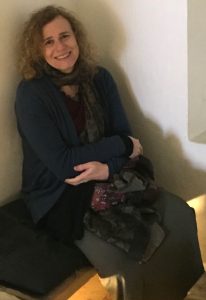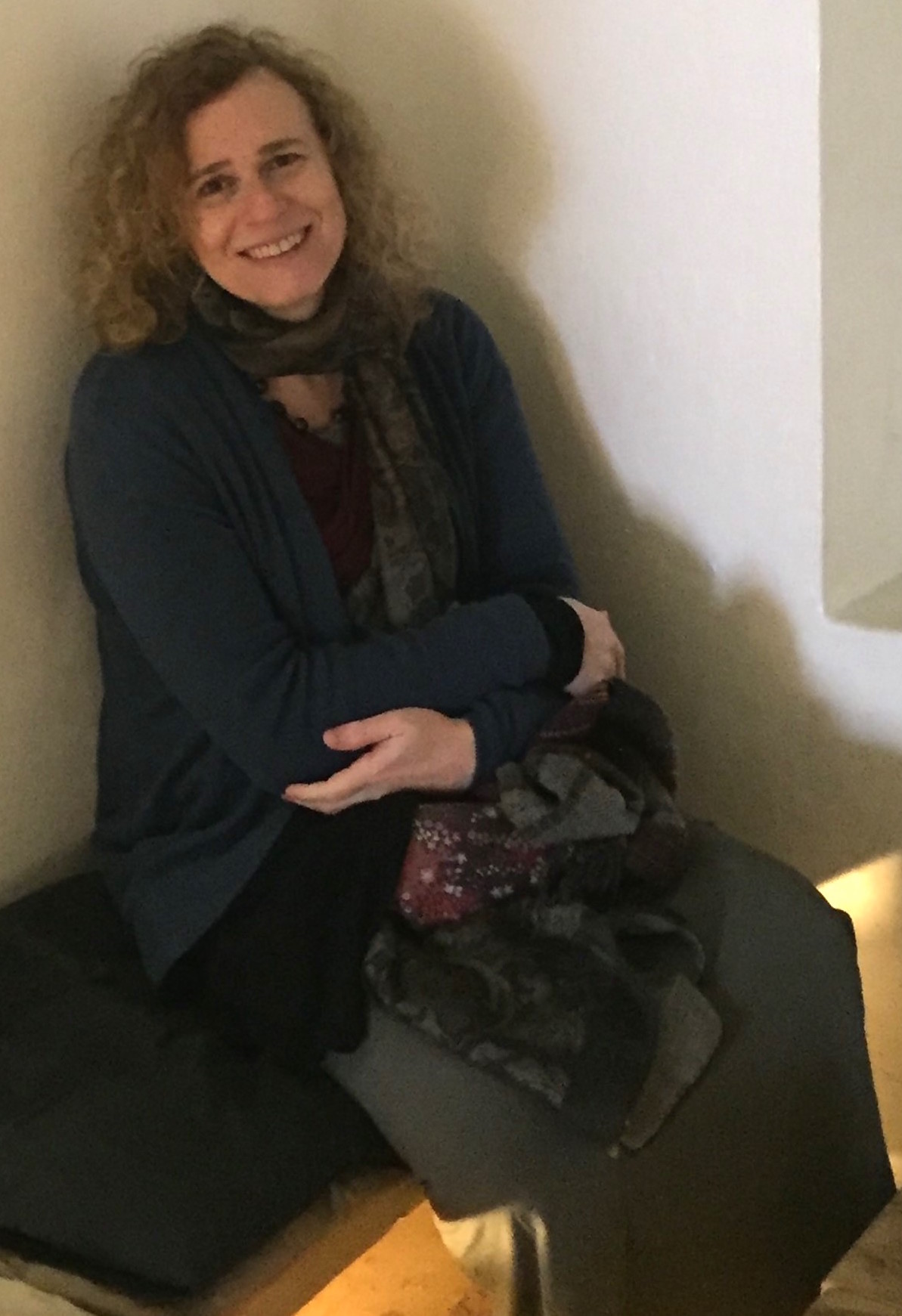
JOY LADIN is the author of eight books of poetry, including her latest collection, Fireworks in the Graveyard (Headmistress Press, 2017). She is a chaired professor of English at Yeshiva University. Among her many awards and achievements, she is the recipient of an NEA Creative Non-Fiction Fellowship, a Hadassah Brandeis Institute Research Fellowship, a Fulbright Scholarship at Tel Aviv University, and a Forward Fives award winner. An occasional interviewee on NPR, she has been a keynote speaker at many universities as well as non-academic venues.
I interviewed Joy Ladin last April at her office on the Stern campus of Yeshiva University in midtown Manhattan.
Samantha Pious: Could you talk about the title poem of Fireworks in the Graveyard? Did the poem get its title from the book, or vice versa?
Joy Ladin: The poem came first. I don’t usually write poems that are based directly on an experience, but I live in a semi-rural area down the street from a graveyard. And people go there to watch fireworks. That summer began with a premonition that it would be my last. I wasn’t upset. My intuitions about the future are always wrong. So the sense that I was about to die almost certainly meant that I wasn’t about to die. I decided to take the premonition as a writing exercise, living the summer as if it really were my last.
I live in a very beautiful area. It’s a suburban street, but surrounded by farms, and there’s a mountain. I promised myself I would take a walk every summer night at the end of the day. The sunsets are usually beautiful in that area, but that summer they were extraordinary. I would take long evening walks and try to experience every evening as though it was one of few I had left. This was a particularly good project for me because I am so bad at noticing and describing things. One of the major effects of feeling as if I was about to die was the urgency of paying attention to everything I saw, smelled, and heard. I tried to get that into the poems—the sensations and the mortal urgency of really experiencing them.
I had been suicidal for much of my life, so I was interested to see how it would feel if I really were about to die, what life would mean. It turned out that I felt pretty good about the life that I was supposedly losing. There were going to be summers and sunsets whether I was there or not. I had a sense of peace. Suddenly I was in the same position as all the other creatures that only live one summer. Instead of feeling like I was being kicked out of life, I felt like I was deeply in tune with the world that I was walking through. It was glowing and burning and the light was changing all the time. I didn’t care that it was getting dark.
SP: All this talk about nature, but in one of your poems you say that you’re “not a nature poet.” Why do you say this?
JL: I have a friend who really is a nature poet. She lives in northern Wisconsin. Whenever she describes the world around her, her language is gorgeous and vivid, specific and vital. Like nature, good nature writing ramifies at every touch. The more we pay attention, the more it’s there. And I have always struggled to pay attention.
Another reason I don’t see myself as a nature poet is that I don’t have a vocabulary of nature. Bird names and flower names—I just can never remember them. (I happen to remember the whippoorwill because it’s a favorite.) You aren’t much of a nature poet if you can’t remember the words for natural things. Do you know the poet Fernando Pessoa? One of his heteronyms, Alberto Caeiro, wrote very simple poems that refused description. Meditations on being. I think in the very last poem in the book The Keeper of Sheep, he says, “By the way, I was the only nature poet.” The one way that I could claim membership in the nature poet club is that I think a lot about the nature of existence.
SP: But I recognize the intricacy of the meadows and fields in your poem “Summering.” In the second section, you seem to engage with Anglo-Saxon alliterative verse. Has Old English poetry influenced your work?
JL: I’m so grateful that you noticed that poem. It was like nothing I had ever done before, filled with nature words, strong stresses, and alliteration. I know very little Old English verse, but there is a strongly stressed quality in Hebrew poetry. It doesn’t work with stresses in the same way, but there are very dense consonant clusters. That was my model. But it led me to what for me was a new way of feeling language, a way that is free of the pressure to sound conversational, or psychologically naturalistic, or present a subjective perception. In that poem, there are just the things of the world, and the throb of the words for those things. Any corner of a field in summer is filled with so many stories, so many lives, growing, dying, eating, being eaten, hiding. In that poem, I felt that at least I was pointing toward the thickness and meaningfulness of existence in a way that I had been scared of.
SP: Could you talk about Fireworks in the Graveyard in relation to your previous seven volumes of poetry?
JL: Fireworks is different from my previous poetry—not impersonal, but not caught up in the emotional flux of the moment. My earlier poetry is filled with abstractions. Often the characters in those poems are personified abstractions interacting with other abstractions. Their sense of existence, like mine when I was living as a man, is not very grounded. They are always teetering on the verge of non-existence, because they have so little flesh, so little world, inside them. One of the things I liked about writing the Fireworks poems was that living as though I were dying didn’t create that sense of panic, of drama. Instead of being about the sense of vanishing, they are about the sense of being here, being a creature among creatures, a dying part of a universe whose life includes but doesn’t depend on mine.
SP: I thought I saw some allusions to Virginia Woolf in your writing.
JL: Thank you! I love Virginia Woolf, and I spent many hours reading her novels aloud with my ex, as well as reading them to myself. It was a huge part of my education, listening to what she teaches about the possibilities of syntax and endlessly ramifying sentences that can go anywhere and do anything. I was in awe of the language she finds for the phenomenal rush of consciousness. So, I would love there to be Virginia Woolf in my poetry. There ought to be, given how much I was trying to write from her.
SP: Do you have any other inspirations beyond Sappho, beyond Virginia Woolf that you’d like to share with the readers?
JL: I am always inspired by Emily Dickinson, Pablo Naruda, and César Vallejo. No matter how much I read them, I can’t do anything like what they do. They remind me what great poetry looks like. When they write, they not only discover but create new possibilities, new forms of meaning, new kinds of truth. I don’t know that I’ve ever managed that, but I try to write toward a sense that I’ve broken into a place that’s unfamiliar to me, where I’m vulnerable and overwhelmed and not sure how it’s all going to come out. That, to me, is the sign that I might be writing poetry.
I have spent decades studying Dickinson’s techniques, trying to learn everything that I can from her. My sense of poetic rhythm and rhyme came from Dickinson. She has such strong control of the pulse of her poems. When I was a young poet, a lot of American poetry programs didn’t teach anything about sound. So I had to get that through Dickinson.
SP: Where do you see poetry in any of its forms or genres going in the future?
JL: I am interested in trans poetics: the techniques we use to create language to represent and express ways of being human for which there is little language, ways of being human our language is not designed to express. A clumsy but historically significant example is Tiresias in The Waste Land. Eliot describes Tiresias as an “old man with wrinkled female breasts.” This was not good poetry, but it was an early attempt to represent a way of being human. Tiresias is both, and neither, male and female.
Today there are more and more trans poets writing, starting magazines, receiving mainstream recognition, creating the lineage we will call “trans poetry.” The pioneering work they are doing when they represent and express trans experience and perspectives is not only a gift to trans people like me, who long for language for ourselves; it is a gift to the human race, because, to paraphrase E. M. Forster’s praise of Virginia Woolf, they are pushing the light of language a little further against the darkness of what it means to be human.
Samantha Pious’ first book, A Crown of Violets (2015), offers a selection of translations of the poetry of Renée Vivien.





